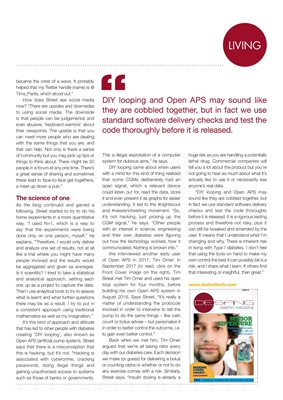
KITLIVING
became the crest of a wave. It probably
helped that my Twitter handle (name) is @
Tims_Pants, which stood out."
How does Street see social media
now? "There are upsides and downsides
to using social media. The downside
is that people can be judgemental and
even abusive, 'keyboard warriors' about
their viewpoints. The upside is that you
can meet more people who are dealing
with the same things that you are, and
that can help. Not only is there a sense
of community but you may pick up tips or
things to think about. There might be 50
people in a forum at any one time. There's
a great sense of sharing and sometimes
these lead to face-to-face get-togethers,
a meet up down a pub."
The science of one
As the blog continued and gained a
following, Street started to try to do his
home experiments in a more quantitative
way. "I used N=1, which is a way to
say that the experiments were being
done only on one person, myself," he
explains, "Therefore, I would only deliver
and analyze one set of results, not at all
like a trial where you might have many
people involved and the results would
be aggregated and given as averages.
Is it scientific? I tried to take a statistical
and analytical approach, setting each
one up as a project to capture the data.
Then I use analytical tools to try to assess
what is learnt and what further questions
there may be as a result. I try to put in
a consistent approach using traditional
mathematics as well as my imagination."
It's this kind of approach and attitude
that has led to other people with diabetes
creating 'DIY looping', also known as
Open APS (artificial pump system). Street
says that there is a misconception that
this is hacking, but it's not. "Hacking is
associated with cybercrime, cracking
passwords, doing illegal things and
gaining unauthorised access to systems
such as those of banks or governments.
This is illegal exploitation of a computer
system for dubious aims," he says.
DIY looping came about when users
with a mind for this kind of thing realized
that some CGMs deliberately had an
open signal, which a relevant device
could listen out for, read the data, store
it and even present it as graphs for easier
understanding. It led to the #nightscout
and #wearenotwaiting movement. "So,
it's not hacking, just picking up the
CGM signal," he says. "Other people
with an interest in science, engineering
and their own diabetes were figuring
out how the technology worked, how it
communicated. Nothing is broken into."
We interviewed another early user
of Open APS in 2017, Tim Omer. In
September 2017 (to read, click on the
Front Cover image on the right). Tim
Street met Tim Omer and used his open
loop system for four months, before
building his own Open APS system in
August 2016. Says Street, "It's really a
matter of understanding the protocols
involved in order to intervene to tell the
pump to do the same things - like carb
count or bolus advise - but personalize it
in order to better control the outcome, i.e.
to gain even better control."
Back when we met him, Tim Omer
argued that we're all taking risks every
day with our diabetes care. Each decision
we make (or guess) for delivering a bolus
or counting carbs or whether or not to do
any exercise comes with a risk. Similarly,
Street says, "Insulin dosing is already a
"DIY looping and Open APS may sound like
they are cobbled together, but in fact we use
standard software delivery checks and test the
code thoroughly before it is released.
huge risk as you are handling a potentially
lethal drug. Commercial companies will
tell you a lot about the product but you're
not going to hear as much about what it's
actually like to use it or necessarily see
anyone's real data.
"DIY looping and Open APS may
sound like they are cobbled together, but
in fact we use standard software delivery
checks and test the code thoroughly
before it is released. It is a rigorous testing
process and therefore not risky, plus it
can still be tweaked and amended by the
user. It means that I understand what I'm
changing and why. There is inherent risk
in living with Type I diabetes. I don't feel
that using the tools on hand to make my
own control the best it can possibly be is a
risk, and I share what I learn. If others find
that interesting or insightful, then great."
www.diabettech.com